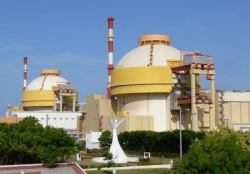Nuclear essential for India's economic growth
14 August 2013
Nuclear energy must be a significant part of the mix if India is to grow electricity supply by 625% to meet development goals, former chairman of the Atomic Energy Commission Anil Kakodkar told students at a graduation ceremony.
 |
| Unit 1 at the Kudankulam plant in Tamil Nadu state is the latest reactor to start up in India (Image: NPCIL) |
Speaking at the Indian Institute of Technology, Gandhinagar (IIT-Gn) on 11 August, Kakodkar said, "Energy is very important for any economic progress ... We can't run industry if we don't have energy."
"If India is to emerge as an economic power then per capita electricity production has to be brought on par with that in the advanced countries," he was quoted as saying by The Economic Times newspaper.
Kakodkar added, "Today the scenario is such that compared to advanced countries we are 14-15 times behind. The average per capita electricity production in an industrially advanced nation is at around 10,000 units, whereas in India it is at around 800 units per person."
He said that an increase of at least 625% in electricity production, to 5000 units per capita, would be needed for India to maintain its economic growth. "If power has to be supplied on such a magnitude on a sustainable basis, then nuclear and solar are the only two sources to meet the requirement," Kakodkar stated. "No other source can do it."
There are currently 20 power reactors in operation in India with a combined capacity of 4385 MWe net. A further seven units are under construction which will add a further 4890 MWe net of capacity once they are all completed by the end of 2016. Plans call for nuclear capacity to reach some 20 GWe by 2020 and 60 GWe by 2032.
India generated a total of some 1000 TWh of electricity in 2012, of which almost 30 TWh was produced by its nuclear power plants and just 1 TWh came from solar, according to figures from the International Energy Agency.
Researched and written
by World Nuclear News